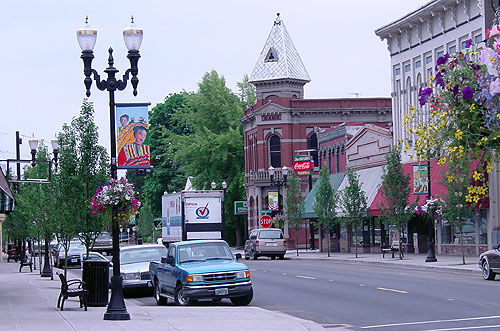The last time I visited Independence was on a cold morning three years ago, the day after Boise Cascade announced the closure of its veneer mill. The mayor and the city manager greeted me with coffee and optimism. When I returned recently, the optimism and coffee were still flowing.
The tiny city (2.3 square miles) on the west bank of the Willamette River has for the past three years been doggedly pushing on its economic development plans, and Mayor John McArdle and City Manager Greg Ellis seemed unbowed by the bad economy, job losses or high unemployment. The longtime mayor and Ellis were full-steam ahead on many fronts. “We’re not immune,” says the hard-charging McArdle. “We’re not Pollyanna. But it doesn’t pay dividends to say, ‘Woe is me.”’
Three years ago, the eight-screen movie theater had yet to open, the fate of the Boise site was unknown, the historic downtown struggled with vacancies, and the need for jobs was huge. Like many small, rural Oregon towns, the poverty levels were and are high.
The last time I visited Independence was on a cold morning three years ago, the day after Boise Cascade announced the closure of its veneer mill. The mayor and the city manager greeted me with coffee and optimism. When I returned recently, the optimism and coffee were still flowing.
The tiny city (2.3 square miles) on the west bank of the Willamette River has for the past three years been doggedly pushing on its economic development plans, and Mayor John McArdle and City Manager Greg Ellis seemed unbowed by the bad economy, job losses or high unemployment. The longtime mayor and Ellis were full-steam ahead on many fronts. “We’re not immune,” says the hard-charging McArdle. “We’re not Pollyanna. But it doesn’t pay dividends to say, ‘Woe is me.”’
Three years ago, the eight-screen movie theater had yet to open, the fate of the Boise site was unknown, the historic downtown struggled with vacancies, and the need for jobs was huge. Like many small, rural Oregon towns, the poverty levels were and are high.
In the ensuing years, the 850-seat cinema has opened and draws crowds from Monmouth, south Salem and Dallas, enough to help launch several new restaurants downtown: the Ragin’ River Steak Company, the Pink House Café and J. Bella’s.

When Boise closed after 43 years of operation, it took 29 good-paying jobs with benefits with it. The site was then bought by Oregon Alder for $4 million, which sold half the property to Forest River, a Dallas company that builds RVs and utility trailers. That operation opened a year ago, and employs about 100 workers, some of them transferred from Dallas. Oregon Alder was going to open a hard-wood mill, but that plan stalled when the housing industry crashed.
In 2007, the city won a Great Stride award from the Northwest Area Foundation for the “significant progress” it has made in reducing poverty long term. The foundation lauded the city for doing that by using tax incentives “to build stronger businesses with higher wages, such as those given to a cabinet company that expanded and in turn offered employees the potential of 50% wage increases from their starting salaries. Developing public/private partnerships, infrastructure projects, economic diversification, historic preservation, and tourism have all contributed to the city’s success.”
The city took the $100,000 award and used it to create a small-business incubator, which is scheduled to open in January in a storefront on Main Street with a half-time director.
There are more projects on the boards for Independence, including a new ball field. The 50-acre site was donated by Olsen Agriculture and the plan is to have six baseball fields and eight soccer fields completed by spring 2011.
The city just finished its vision plan for 2020. It’s an ambitious plan that calls for improving the historic downtown, finding more transportation options, provide more opportunities for youth, and increasing local living wage jobs. It’s a town that is struggling with job loss, downtown vacancies and the bad economy, but it’s taking action.
“One business in our community makes a difference,” says McArdle.
If you are tiny — especially if you are tiny — the house gets built one brick at a time.
Robin Doussard is Editor of Oregon Business.


